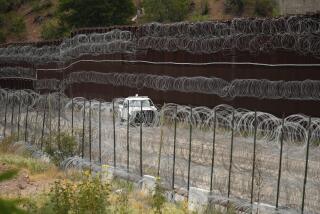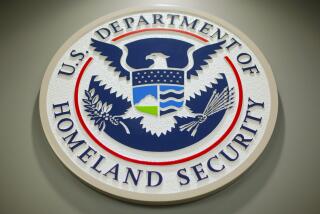Flow of Cubans Bound for Florida Dwindles, U.S. Says : Policy: Administration officials see signs that the worst of exodus might be over. About 100 are rescued daily now, compared to 3,000 last week.
- Share via
WASHINGTON — The number of Cuban immigrants sailing toward Florida remained low Monday, despite the return of calm seas in the region, raising hopes by the Clinton Administration that Cubans finally are beginning to get the message that the journey would be fruitless.
Coast Guard officials said that as of 6 p.m. EDT, their cutters had rescued 118 refugees from the Florida Straits--not much above the 84 picked up Sunday. By contrast, only a week ago the number of immigrants being rescued each day was running about 3,000.
Publicly, Administration officials were cautious in declaring their efforts to stem the exodus a success. State Department spokesman Mike McCurry noted that squalls over the weekend had kept many from setting out. “We’re watching to see what happens,” he said.
However, officials directly involved in handling the refugee problem said there were encouraging signs that the worst of the exodus might be over. “People would have begun coming again if they were going to,” one official said. “The next 48 hours will be the key.”
The developments came as the State Department disclosed that the limited talks on the migration issue that the United States and Cuba have scheduled are to begin in New York on Wednesday or Thursday and last two or three days.
Cuban President Fidel Castro has called for broader negotiations involving a lifting of the U.S. embargo against Cuba and a return of the Guantanamo Bay Naval Base but Washington has rejected that. As a compromise, the talks will involve only the migrant issue.
U.S. Secretary of State Warren Christopher hinted Sunday that, if Castro agrees to stop Cubans from going to sea in rafts, the Administration may increase the number of Cubans that it permits to enter the United States through normal immigration channels.
The State Department also essentially declined any comment Monday on Castro’s apparent decision to prohibit the balseros , as the raft-riders are called, from taking children with them on the perilous voyage across the straits.
“If such a policy by the Cuban government is designed to discourage them from taking a very unsafe journey . . . we would welcome steps to discourage that type of immigration,” McCurry said. “We will watch to see how this order . . . is implemented in coming days.”
Last week the Administration prohibited Cuban Americans living in the United States from sending money to Cuba. Monday, the government also limited the content of any gift parcels sent to Cuba.
Under new rules published by the Commerce Department, gift boxes may contain food, medicine, vitamins, seeds, medical devices, clothes, personal hygiene items, soap-making equipment, fishing tackle and some radio equipment.
Items such as jewelry, watches, bicycles, sewing machines or household goods--which had been permitted under previous regulations--now are prohibited.
U.S. policy toward Cuba has changed in recent days. For 35 years, the United States permitted virtually all Cuban refugees who landed here to stay in the country as legal immigrants.
In an attempt to stem the tide, however, the Administration reversed that last week after the flood of immigrants abruptly surged.
Under current policy, Cubans picked up at sea are sent to detention camps at Guantanamo, where they are denied entry to the United States.
* RELATED STORIES: B1, E3
More to Read
Sign up for Essential California
The most important California stories and recommendations in your inbox every morning.
You may occasionally receive promotional content from the Los Angeles Times.










